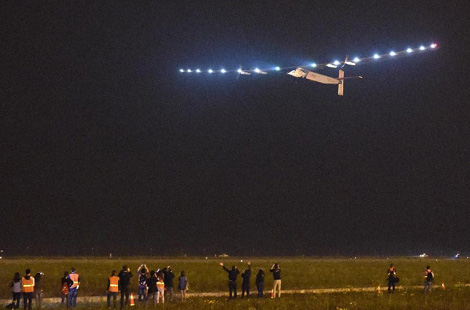S. Korea to belatedly ban MERS suspects from leaving country
Updated: 2015-06-01 18:31
(Xinhua)
|
||||||||
SEOUL - South Korea plans to impose a ban on suspected infectees with the deadly Middle East Respiratory Syndrome (MERS) from leaving the country amid mounting criticism over the bungling initial response by the government.
Kwon Joon-wook, chief of the central headquarters for management of the MERS, told a press briefing Monday that the Justice Ministry's immigration office would take limited measures toward those required to be isolated for suspicions of the MERS infection.
As of Monday, 682 South Koreans were isolated and observed for the possible MERS contagion as they had close contacts with the already infected persons.
The number of South Korean patients infected with the deadly viral disease rose to 18 on Monday, just 12 days after the patient zero was confirmed positive for the MERS corona virus on May 20.
Yonhap News Agency reported that suspected MERS infectees would be prohibited from leaving the country from Monday.
Kwon said that such measures were demanded during the meeting between government officials and ruling party lawmakers held earlier in the morning.
The prohibition of the MERS suspects' departure for foreign countries came after a 44-year-old South Korean man left for China on May 26 despite recommendations from a doctor of dropping his travel plan.
The man visited the hospital, where his father and the patient zero were hospitalized, on May 16 and stayed there for about four hours. Three days later, he began to suffer a fever.
Though a doctor advised him to cancel his trip to China, the man flew from South Korea to Hong Kong on May 26 via an Asiana Airlines flight and entered the southern Huizhou city through Shenzhen by bus.
The government has been under rising criticism toward its insufficient and careless response to the spread of the MERS.
The 68-year-old first patient visited three hospitals for treatment after suffering a fever for an unidentified reason. When he visited the fourth hospital, the doctor suspected him of being infected with the MERS as he returned to South Korea on May 4 from his visit to Bahrain.
On May 18, the doctor asked the Korea Centers for Disease Control and Prevention (CDC) to conduct a test of the 68-year-old man, according to local news channel YTN reports.
The CDC said in response that the agency cannot accept the test request as Bahrain is not a country where MERS was identified before. Instead, the agency called on the doctor to test him for 12 other respiratory illnesses.
After the patient zero of the MERS was tested negative for the 12 respiratory diseases, the CDC accepted the test request " reluctantly." The CDC told the doctor that if the patient tested negative for the MERS, the hospital and the doctor should be held accountable for it.
The patient was confirmed positive for the MERS on May 20, two days after calling for the agency's confirmation.
The first patient has infected 17 persons, including an infectee who went to China against the medical advice, and has driven hundreds of others into being isolated for observation during the incubation period of two weeks.
South Korean President Park Geun-hye said at a meeting with top presidential aides on Monday that initial response was insufficient despite a great importance of the early response in preventing the spread of contagious diseases like the MERS.
Park urged officials to make all-out efforts to solidify the country's quarantine system as the infectious disease spread across borders, saying that any single person who had contact with the infectees should not be excluded from the government's management list.
The MERS is a respiratory illness caused by a new type of corona-virus that is similar to the virus causing Severe Acute Respiratory Syndrome (SARS). There is no vaccine or treatment for the disease, with its fatality rate reaching 40.7 percent.
The first case was detected in Saudi Arabia in 2012. The World Health Organization has reported over 1,000 cases of MERS globally and more than 400 deaths.
- Bridging rural-urban gap in education from start
- Overseas study consultancy offers scholarships to top 5 US universities
- China trying to reach 13 people near MERS patient
- Gaokao countdown begins with incense and prayers
- Children's Day celebrated across China
- Ballet dancers perform at Zhalong National Nature Reserve in China's Qiqihar
- IOC publishes evaluation report on 2022 bids
- MERS-infected S. Koreans rise to 18, no tertiary infection reported
- S. Korea to belatedly ban MERS suspects from leaving country
- Chinese rifle shooters shine at Munich World Cup
- Cameron in Paris to push for EU reforms
- Volcano erupts on southern Japanese island

 Ten injured in crane accident in Manhattan
Ten injured in crane accident in Manhattan
 Forum trends: Becoming 'a little more Chinese'
Forum trends: Becoming 'a little more Chinese'
 Giraffe survives for five years with zig-zag neck
Giraffe survives for five years with zig-zag neck
 World's 15 most valuable brands of 2015
World's 15 most valuable brands of 2015
 The world in photos: May 25- 31
The world in photos: May 25- 31
 Solar plane departs from China to Hawaii
Solar plane departs from China to Hawaii
 Modeled on the United States Capitol
Modeled on the United States Capitol
 Highlights of National Children's Wear Design Contest
Highlights of National Children's Wear Design Contest
Most Viewed
Editor's Picks

|

|

|

|

|

|
Today's Top News
Chinese soldier
gets UN award
Nation's astronauts eager for foreign missions
China committed to upholding peace, stability in South China Sea
Li's trip a watershed in China-Latin America ties
Kerry delays return to US after injury in bicycle crash
Californians turn to Australia to learn how to fight drought
China issues six-point response to US remark on South China Sea issue
Chinese ambassador warns US against escalating situation in S China Sea
US Weekly

|

|






